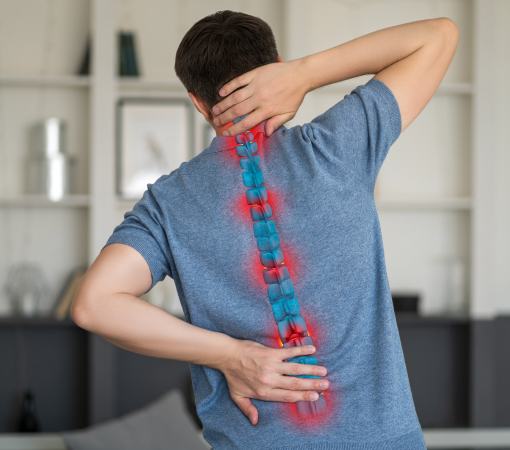Spine Surgeon
Degenerative Disc Diseases
Degenerative Disc Diseases
Degenerative Disc Disease (DDD) is the progressive breakdown of spinal discs, resulting in the loss of shock-absorbing capabilities and potential issues like spinal stenosis. Advanced age is a key risk factor, contributing to disc degeneration. Pain, common in the lower back and neck, varies from mild discomfort to intense, intermittent pain. Immediate treatment often includes pain management and personalized strategies advised by spine surgeons.
What are the causes and symptoms of Degenerative Disc Disease?
Causes:
- Age: Spinal degeneration begins around the age of 20-25, as spinal discs lose water content and thin over time, contributing to pain-causing spinal issues.
- Activity Levels: Daily activities can cause tiny tears in the disc’s exterior wall, leading to pain and, over time, the potential for a herniated or slipped disc.
- Injuries: Back injuries causing instability, soreness, or swelling increase the risk of degenerative disc disease.
- Family History: Genetic predisposition plays some role, and if parents or blood relatives have the condition, there’s an increased risk of developing it.
- Spinal Diseases: Conditions like ankylosing spondylitis, which fuses vertebrae, heighten the risk of degenerative disc disease.
- Excessive Weight or Obesity: Being overweight adds strain to the spine, compressing spinal discs and making individuals more susceptible to disc degeneration.
- Smoking: Smoking contributes to spinal disc degeneration, increasing the likelihood of degenerative disc disease.
Symptoms:
- Pain that worsens with movement, such as walking, sitting, twisting, bending, or lifting.
- Pain is typically felt in the upper thighs, buttocks, and lower back.
Intermittent or persistent pain that can last for days or even months. - Relief is often obtained by lying down or changing position.
- May occasionally lead to tingling or numbness in the legs or arms.
How to diagnose Degenerative Disc Diseases?
- Imaging Studies: X-rays, CT scans, and MRIs are commonly employed to visualize the spine’s structure, disc condition, and detect any abnormalities contributing to degeneration.
- Discography: In some cases, discography may be utilized, involving the injection of a contrast dye into the affected disc to assess its structure and identify pain-triggering areas.
- Electromyography (EMG): EMG may be conducted to assess nerve function and identify areas of nerve compression, helping confirm the diagnosis.
- Blood Tests: While less common, blood tests may be conducted to rule out other potential causes of symptoms, such as infections or inflammatory conditions.
What are the complications of Degenerative Disc Diseases?
- Prolonged Pain: The disease often manifests as chronic pain, impacting daily life and well-being.
- Restricted Mobility: Degeneration may limit the range of motion, affecting flexibility and daily activities.
- Altered Posture: Changes in spinal alignment can result in shifts in posture, potentially causing discomfort.
- Weakened Muscles: Progressive disc degeneration can contribute to muscle weakness, affecting overall strength.
- Nerve Impingement: Advanced stages may lead to nerve compression, presenting symptoms like numbness or weakness.
What is the treatment for Degenerative Disc Diseases?
Heat Therapy (Thermotherapy):
Heat therapy boosts blood circulation, delivering nutrients and expelling toxins, aiding the healing process in degenerative disc disease.
Physical Therapy:
Essential for pain relief and spine function maintenance, physical therapy employs tailored exercises to enhance flexibility and strengthen supporting muscles in degenerative disc disease.
Cold Therapy (Cryotherapy):
Reducing pain and inflammation, cryotherapy slows blood circulation, providing localized relief for individuals managing degenerative disc disease.
Ultrasound Therapy:
Using sound waves, ultrasound therapy targets muscle spasms and pain, contributing to non-invasive pain reduction in degenerative disc disease.
TENS (Transcutaneous Electrical Stimulation):
TENS utilizes electrical stimulation for pain relief and improved mobility in degenerative disc disease, modulating nerve signals for non-pharmacological management.
Laser Therapy:
Decreasing inflammation and expediting tissue recovery, laser therapy provides targeted relief in degenerative disc disease, promoting cellular healing.
What are the surgical treatments for degenerative disc?
- Discectomy
- Spinal Fusion
- Artificial Disc Replacement
Synapse Spine in Mumbai is a top spine setup for specialized spine care in the area, offering comprehensive treatment options and minimally invasive procedures. Schedule your appointment today and experience the expertise of Synapse Spine firsthand on your journey to better spinal health.

